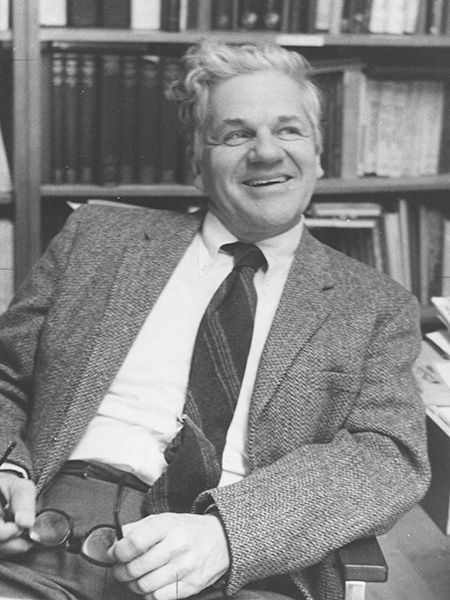In memoriam: Melvin Simpson
Melvin Simpson, founder of the biochemistry department at Stony Brook University and a member of the American Society for Biochemistry and Molecular Biology since 1955, died January 31, 2022, the society learned recently. He was 100 years old.

Simpson was born July 15, 1921. He earned his Ph.D. in 1949 from the University of California at Berkeley for studies of protein biosynthesis in the laboratory of Harold Tarver and began his independent career as a professor at Yale before moving to Dartmouth where he was an American Cancer Society Professor.
In 1967, Simpson joined the faculty of Stony Brook University to start a section in biochemistry within the biology department. Two years later, biochemistry became a separate department with Simpson as the founding chair. He worked to recruit faculty as well as establish a positive inspiring environment. “He always had a smile on his face … he wanted everyone to be happy,” Norm Arnheim recalled in a Stony Brook memorial article.
Protein synthesis was the focus of Simpson’s early scientific career; he pioneered a method to track synthesis using radioactive methionine. Later, his interests expanded to include DNA, in particular mitochondrial DNA synthesis and metabolism. His studies included work on a mitochondrial topoisomerase and mitochondrial DNA evolution. He also studied the mechanism of nucleoside analog AZT, which was being tested as an AIDS antiviral at the time.
Simpson served in the US Navy during World War II. He maintained a love of boats and sailing his whole life, often sharing stories of places he visited. His wide-ranging interests beyond scientific research included archeology, a subject in which he took classes at Stony Brook while a professor.
Simpson’s colleagues and former students remember him as someone who treated everyone with respect and kindness; they write that he was a good mentor who asked critical questions while also supporting his mentees and colleagues with a helping hand both within and outside of the lab.
Enjoy reading ASBMB Today?
Become a member to receive the print edition four times a year and the digital edition monthly.
Learn moreGet the latest from ASBMB Today
Enter your email address, and we’ll send you a weekly email with recent articles, interviews and more.
Latest in People
People highlights or most popular articles

Building a career in nutrition across continents
Driven by past women in science, Kazi Sarjana Safain left Bangladesh and pursued a scientific career in the U.S.

Kiessling wins glycobiology award
She was honored by the Society for Glycobiology for her work on protein–glycan interactions.

2026 ASBMB election results
Meet the new Council members and Nominating Committee member.

Simcox wins SACNAS mentorship award
She was recognized for her sustained excellence in mentorship and was honored at SACNAS’ 2025 National Conference.

From humble beginnings to unlocking lysosomal secrets
Monther Abu–Remaileh will receive the ASBMB’s 2026 Walter A. Shaw Young Investigator Award in Lipid Research at the ASBMB Annual Meeting, March 7-10 in Washington, D.C.

Chemistry meets biology to thwart parasites
Margaret Phillips will receive the Alice and C. C. Wang Award in Molecular Parasitology at the ASBMB Annual Meeting, March 7-10 in Washington, D.C.

